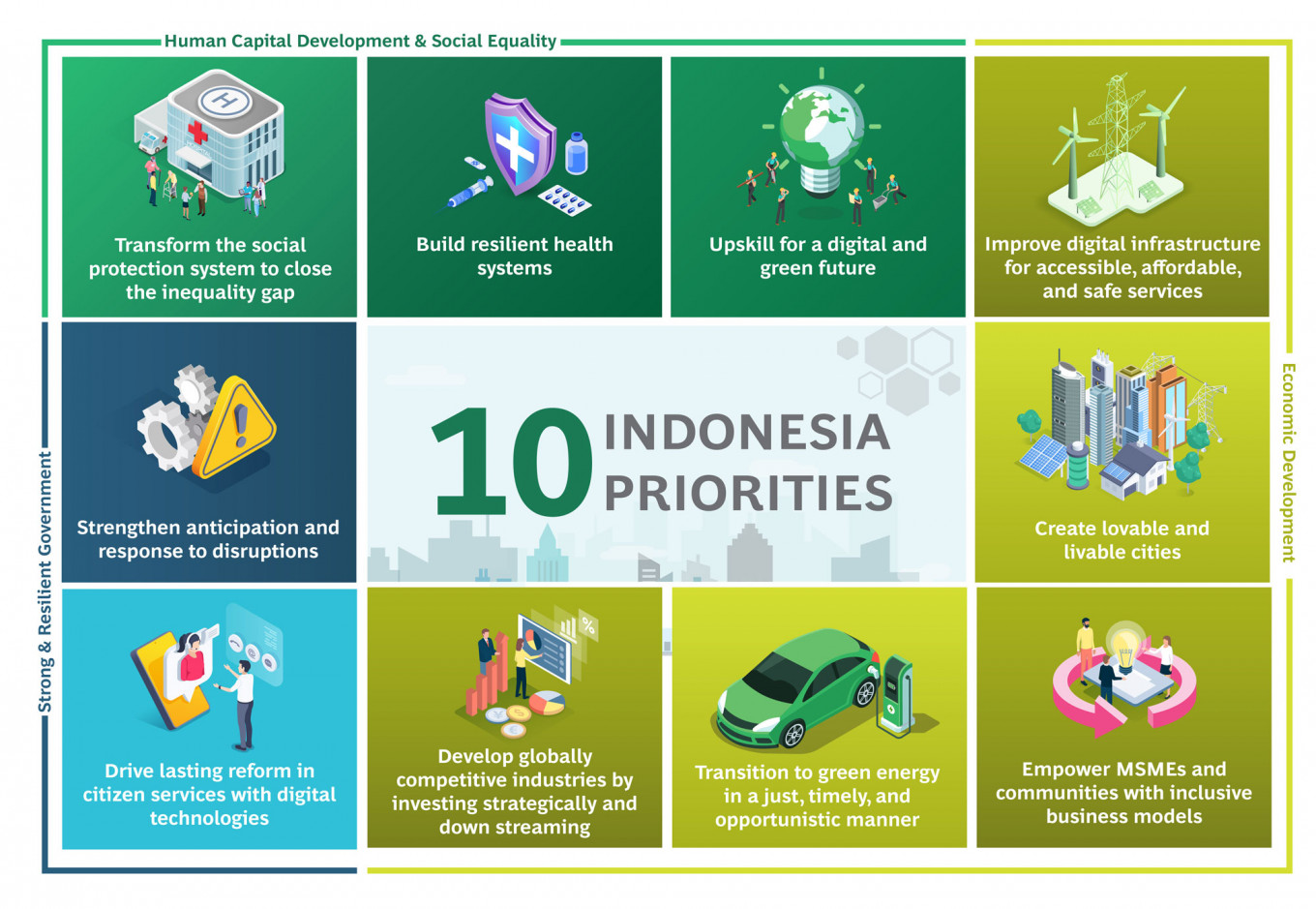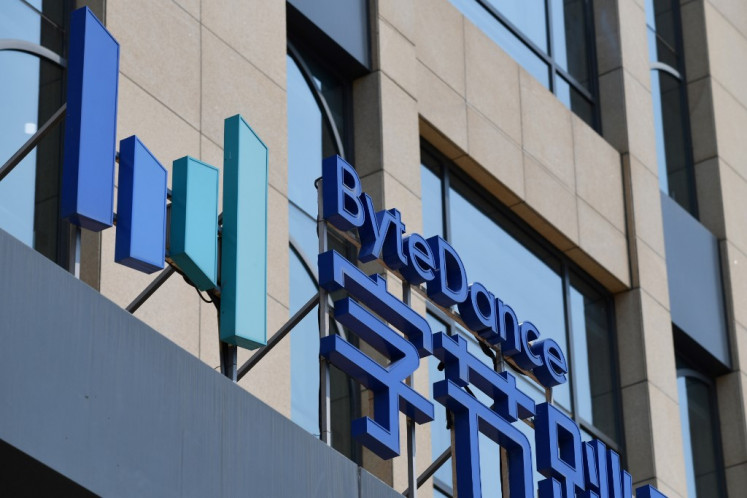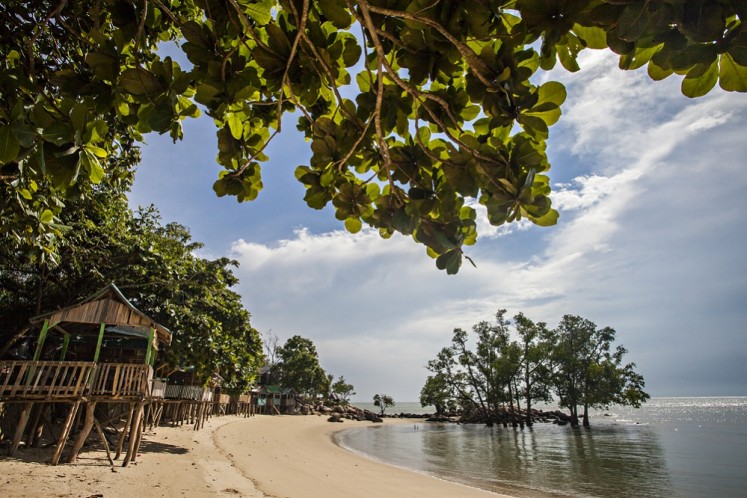Popular Reads
Top Results
Can't find what you're looking for?
View all search resultsPopular Reads
Top Results
Can't find what you're looking for?
View all search results10 ideas to turn Indonesia’s decade of progress into a century of prosperity
Change text size
Gift Premium Articles
to Anyone
T
his marks the beginning of a series of articles examining Indonesia's top-10 priorities in achieving the country’s vision. In subsequent instalments, we will look closely at specific priorities, sharing insights and actionable recommendations.
Indonesia has a bold vision for 2045. This ambitious plan, encapsulated in the government's Visi Indonesia Emas 2045, aims to lift the country into the ranks of high-income economies and drastically reduce poverty rates.
To this end, policy reforms and initiatives have been implemented. Infrastructure has become a key priority, with 1,640 kilometers of toll roads and 4,600km of other roads, 15 new airports and 124 new seaports constructed between 2014 and 2019. Indonesia has also focused on improving the ease of doing business in the country, its ranking by the World Bank jumping from 120th in 2014 to 73rd, today. Indonesia has also seen a significant reduction in poverty rates, dropping from 11.3 percent in 2014 to 9.5 percent in 2022.
To sustain momentum, Indonesia needs to continue charting the path of reform. Boston Consulting Group (BCG) has outlined 10 key areas that Indonesia must prioritize to achieve its vision.
Investing in people: Building a more equal and future-proof society
The first pillar of Visi 2045 is human development. The most important challenge of this pillar is protecting vulnerable groups and preparing workers for the future. Indonesia's aging population currently stands at around 20 million, or approximately 10 percent of the total population. By 2026, this number is estimated to hit 33 million. This aging population, along with other shifts in demography and challenges such as disasters and pandemics require Indonesia to rethink how vulnerable groups can be protected by further reforming its social protection policies.
Health is essential for economic and social development, as the pandemic has demonstrated. Indonesia's health sector has made a significant achievement by producing IndoVac, a COVID-19 vaccine licensed from Sinovac Biotech. However, Indonesia still needs to better prepare for future crises. For example, Indonesia should increase local production of devices and extend healthcare coverage to remote areas, as well as train more doctors with specialized skills.
Indonesia’s pledge to achieve net-zero emissions by 2060 makes green skills as essential as digital ones. White-collar workers and farmers should be digitally enabled and trained to leverage technology, while miners must be equipped with green skills. To ensure all groups are equally equipped for the future, policymakers and businesses must invest in green and other future-proof skills.
Revitalizing the economy: fostering sustainable economic development
To achieve growth in the second pillar, sustainable economic development, Indonesia needs to grow its economy to balance its social, environmental and financial goals.
To achieve a digital-based social economic growth, it is vital to invest in expanding digital connectivity, accelerate infrastructure projects and improve all other areas of Indonesia’s digital economy, including its horizontal platforms, applications and service layers, while ensuring the affordability, quality and safety of digital services.
By 2045, the Indonesian urban population will exceed 70 percent, creating the need for new sustainable cities that can provide better-quality living for residents. The smart and green concept of the new capital city, Nusantara, should be a template for future city development, which needs to lead to transformation of the existing major cities today.
Another key priority in the social economy is to support over 62 million micro, small and medium enterprises (MSMEs), which form the backbone of Indonesia’s economy. One way to do this is by embracing an inclusive business model, which aims to create a multi-stakeholder ecosystem. This then provides MSMEs with access to finance, knowledge, technology and market access, supporting them in each step of the value chain.
To ensure balance in the environment, Indonesia needs to transition to green energy in a just, timely and opportunistic manner. Indonesia is the world's eighth-biggest greenhouse gas (GHG) emitter, with GHG emissions growing in parallel with economic growth. However, in terms of per-capita emission, Indonesia ranks low at 113th on the list. It is crucial for Indonesia to follow a transition plan adapted to its unique conditions while pushing for new investments to fund this energy change.
In response to the dynamic global situation, including the food and energy crisis, Indonesia is compelled to strengthen its national resilience in strategic sectors. Indonesia should continue to implement and expand its downstream industry policy, gradually reducing its dependence on raw mineral exports, and transitioning toward higher value-added manufacturing. National industrial resilience does not have to equal protectionism. On the contrary, it means being open to investment. Indonesia's effort to boost investment in the electric vehicle (EV) industry exemplifies this. With 21 million tonnes of nickel, the largest reserve in the world, Indonesia can convert raw nickel into products such as electric car batteries, thereby adding value to the commodity and stimulating economic growth.
Empowered governance: Adapting to disruptions
The last pillar of Visi 2045 is about strengthening Indonesia’s governance. Indonesia has made significant strides in formulating and launching several business-enabling policies and reforms. To ensure the continued and sustainable success of these reforms, it is essential to undertake parallel bureaucracy reform by leveraging the digital transformation to enhance citizen service delivery.
COVID-19 highlighted the vital need for resilience in government, which entails the nation’s capability to absorb shocks, adapting and thriving when faced with unprecedented challenges. This means focusing more on aligning its goals and activities with those of a broader economic or social system to create mutually beneficial situations for different public organizations.
Indonesia has beaten the odds and made incredible progress this past decade. For this to continue in the century ahead, Indonesia needs to set the right priorities to achieve it.
Authors:
- Haikal Siregar, managing director and partner, and head of BCG Indonesia
- Verra Wijaya, knowledge expert and team manager, Boston Consulting Group
This article was published in collaboration with Boston Consulting Group










